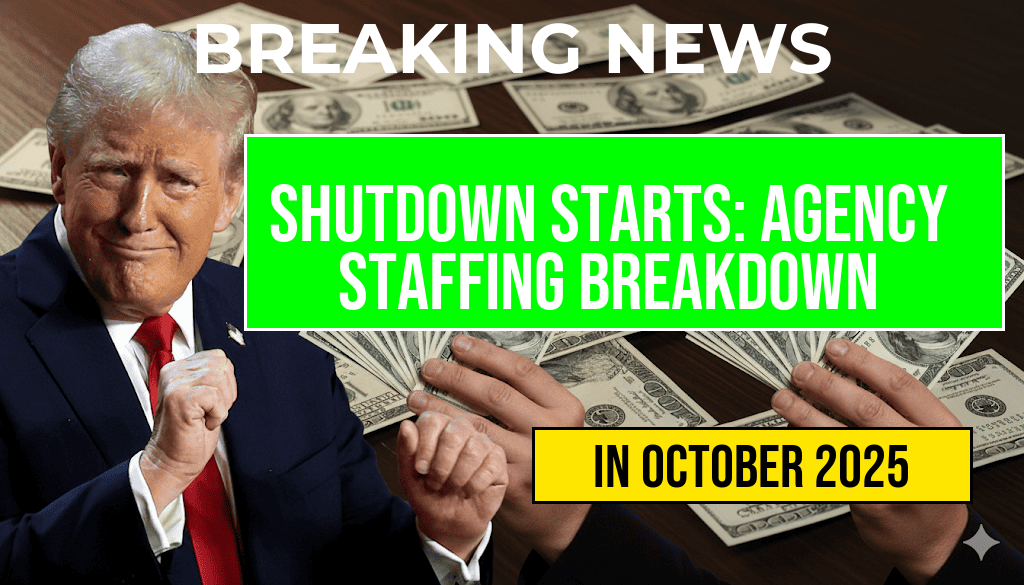The United States government has officially entered a partial shutdown following the failure of Congress to pass a funding bill before the midnight deadline. This development halts or limits operations across numerous federal agencies, affecting millions of Americans relying on social services, law enforcement, and other government functions. While some agencies will continue limited operations, many will suspend non-essential activities, furlough employees, or operate with reduced staffing. The shutdown underscores ongoing political disagreements over budget priorities and spending levels, with negotiations still underway in Congress to resolve the impasse. As the situation unfolds, a detailed understanding of which agencies remain operational and which do not becomes crucial for the public and stakeholders alike.
Impacts on Federal Agencies and Services
Essential vs. Non-Essential Operations
Federal agencies are categorizing their functions into essential and non-essential. Essential services, such as national security, public safety, and health emergencies, typically continue uninterrupted. Conversely, non-essential programs face staffing reductions or temporary closures. The following breakdown offers clarity on the current status of major agencies and their operations during the shutdown.
Social Security Administration
- Operation Status: Continued
- Impact: Social Security payments will be disbursed as scheduled. Customer service representatives will handle urgent inquiries, and vital functions like issuing new benefits or processing fraud investigations will proceed.
- Notes: The SSA is funded through mandatory spending and thus remains operational despite the shutdown.
Internal Revenue Service (IRS)
- Operation Status: Limited
- Impact: Most taxpayer services, including processing returns and refunds, will be delayed or halted. The IRS’s enforcement activities, such as audits, will be scaled back, and most customer support lines will be closed.
- Notes: The IRS has announced delays in processing certain applications and refunds, which could affect millions of Americans during tax season.
Department of Defense (DoD)
| Function | Status | Details |
|---|---|---|
| Active Duty Military | Working | All active personnel continue to perform their duties, including deployments and critical missions. |
| Contractors & Civilians | Varies | Many civilian employees and contractors face furloughs unless involved in essential activities. |
| Research & Development | Paused | Most non-essential research projects are suspended until funding resumes. |
Transportation Security Administration (TSA)
- Operation Status: Fully operational
- Impact: Security screenings at airports continue without disruption, ensuring passenger safety remains a priority. TSA personnel are expected to report for duty as usual.
- Notes: TSA funding is secured through mandatory appropriations, preventing service interruption during the shutdown.
Other Notable Agencies
While some agencies maintain operations, others face significant reductions:
- Environmental Protection Agency (EPA): Non-essential activities, including inspections and enforcement, are largely halted.
- Department of Education: Most programs are suspended; federal student aid processing is delayed.
- Federal Courts: Many proceedings are postponed, but essential judicial functions continue.
Extended Effects and Public Response
The shutdown’s ripple effects extend beyond immediate agency operations. Small businesses relying on federal grants, students awaiting financial aid, and SNAP recipients may experience delays or reduced access to services. The stock market response has been mixed, reflecting investor concerns about economic stability and government credibility.
Public sentiment remains divided, with some stressing the importance of fiscal responsibility and others emphasizing the need for government functions to continue unimpeded. Lawmakers continue negotiations, with the Biden administration calling for a bipartisan consensus to reopen the government fully.
Looking Ahead
Efforts are underway in Congress to draft a funding agreement that can pass both chambers and avoid further shutdowns. Meanwhile, federal employees face uncertainty about their paychecks, and agencies brace for ongoing operational challenges. The situation highlights the persistent political divisions over federal spending and the importance of swift legislative action to restore full government functioning.
For updated information on agency operations and resources, visit USA.gov or the Congress.gov.
Frequently Asked Questions
What agencies are affected by the government shutdown?
The government shutdown impacts various agencies, including Social Security, IRS, Defense, and TSA. Some agencies continue operations while others suspend non-essential services.
Which government services are still operational during the shutdown?
Essential services such as national security, air traffic control, and social security payments typically continue during a shutdown. Agencies like Military and Emergency responders also remain operational.
Will Social Security payments be affected by the shutdown?
No, Social Security payments generally continue during a government shutdown. Beneficiaries can expect their payments to be processed as usual unless the shutdown extends significantly.
How does the shutdown impact IRS operations and tax services?
During a government shutdown, many IRS services are limited or paused, affecting tax processing and customer support. However, key tax deadlines and refunds may still be processed depending on the situation.
What is the status of TSA workers and airport security during the shutdown?
TSA workers are typically considered essential personnel and are required to work during a shutdown to ensure airport security. However, some support staff may face furloughs, potentially impacting airport operations.








